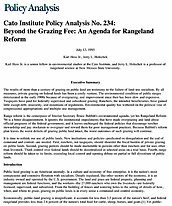The results of more than a century of grazing on public land are testimony to the failure of land-use socialism. By all measures, private grazing on federal lands has been a costly venture. The environmental condition of public ranges deteriorated in the early 1900s because of overgrazing, and improvement since then has been slow and expensive. Taxpayers have paid for federally supervised and subsidized grazing. Ranchers, the intended beneficiaries, have gained little except debt, insecurity, and mountains of regulations. Environmental quality has withered on the political vine of congressional appropriations and multiple-use management.
Range reform is the centerpiece of Interior Secretary Bruce Babbitt’s environmental agenda, yet his Rangeland Reform ’94 is a bitter disappointment. It ignores the institutional impediments that have made overgrazing and land abuse official programs of the federal government, and it leaves unchanged the federal policies that discourage rancher stewardship and pay stockmen to overgraze and reward them for poor management practices. Because Babbitt’s reform plan leaves the worst defects of grazing public land intact, the worst outcomes of such grazing will continue.
It is time to rethink our use of public lands. New institutions and policies–predicated on deregulation and the end of command and control–are needed. First, ranchers, not taxpayers, should shoulder the fiscal burden of private grazing on public lands. Second, grazing permits should be made marketable to persons other than ranchers and for uses other than livestock. Third, control over federal lands should be decentralized in selected areas on a trial basis. Fourth, range reform should be taken to its limits, extending local control and opening debate on partial or full divestiture of public lands.
About the Authors

This work is licensed under a Creative Commons Attribution-NonCommercial-ShareAlike 4.0 International License.
